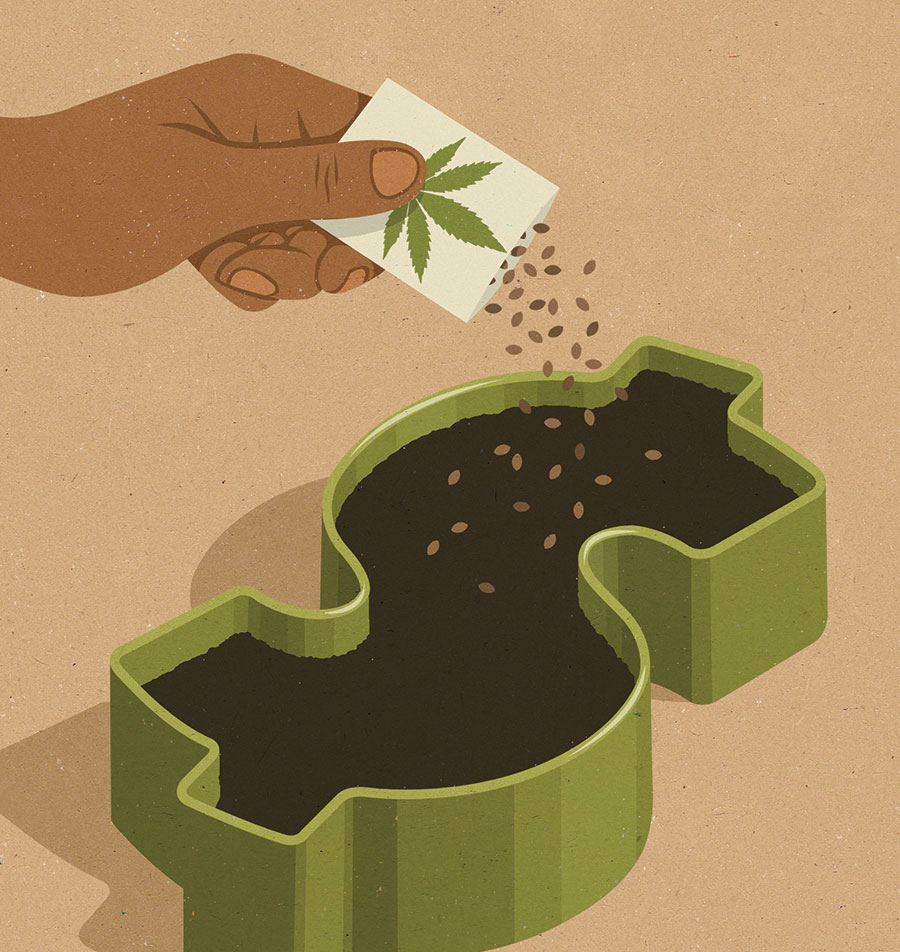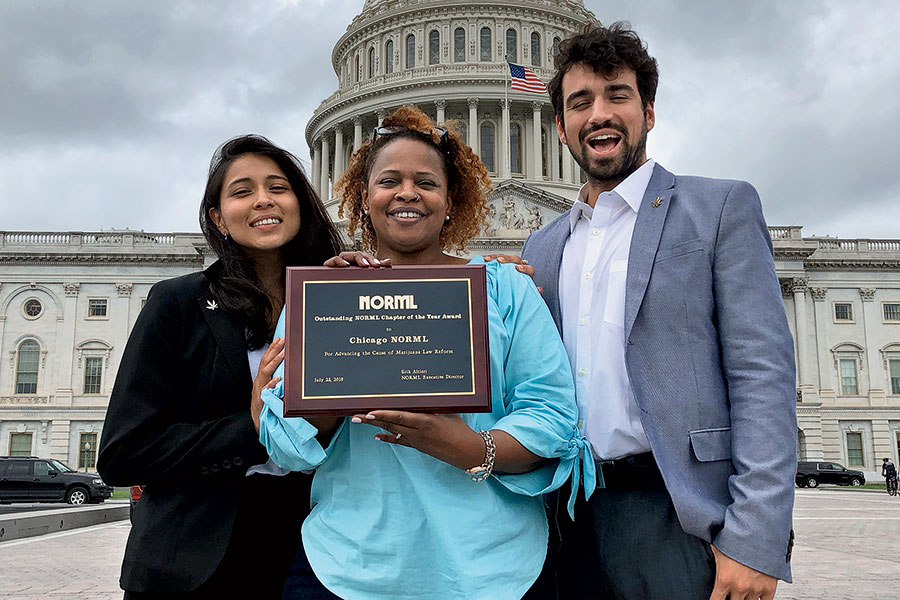 Illustration: John Holcroft
Illustration: John HolcroftEdie Moore wishes Governor-elect J.B. Pritzker would slow down his push to legalize recreational marijuana — which is striking because Moore is the executive director of the Chicago chapter of the National Organization for the Reform of Marijuana Laws, the nonprofit devoted to, you know, the legalization of marijuana. Moore even has a stake in this budding industry, as a part owner of Mission, the sole medical cannabis dispensary on Chicago’s Southeast Side. “Our biggest concern is the rush,” she says, “the rush to legalize when we don’t believe that we have a full picture of a social equity program in place.”
The social equity argument goes like this: If marijuana is going to be made legal, then the people who suffered the most from its being illegal — particularly those in black and Hispanic neighborhoods most frequently targeted in drug crackdowns — should benefit. But the owners of licensed cultivation farms and dispensaries in parts of the country where some form of use is already legal have been overwhelmingly white and operate almost entirely outside of minority communities, not employing their residents or feeding them tax dollars.
Many activists and lawmakers would like to correct that imbalance before the so-called green rush escalates further. A September Forbes article estimated that legal marijuana is already a $9 billion industry nationally and will soon balloon to $50 billion a year. With Pritzker in, Chicago businesses are making moves to get their share. Cresco, a huge player in medical pot here, announced in October a $100 million expansion, which includes tripling production by early 2020. And Green Thumb Industries, which makes hundreds of types of cannabis products, became the first marijuana company in Illinois to go public.
Yet over the past couple of years, says National Cannabis Industry Association media relations director Morgan Fox, there’s been an “increase in consciousness” as the question has shifted from “whether or not cannabis should be legal” to “how it should be legal.” Here in Illinois, Representative Kelly Cassidy of the 14th District (which includes parts of Rogers Park and Uptown) and Senator Heather Steans of the 7th District (which encompasses the same territory) have made equity central to the recreational marijuana legislation they’re preparing for the new term after their prior bills failed last spring. “The social justice component has been our motivating force,” Cassidy says.

The state’s limited medical marijuana law, passed in 2013, allowed for up to 22 cultivation and 60 retail licenses. Although applicants received “points” for diversity in ownership groups, that wasn’t enough to shake up the industry’s demographics. One factor was the high price of entry coupled with the scarcity of venture capital money for minority entrepreneurs. Moore, who was part of a minority-led group that obtained licenses to grow and sell medical cannabis, saw that firsthand. After its startup costs rose to $2.5 million, she says, her group had to take on a nonminority investor, who assumed a 60 percent stake. “There’s not a lot of minority people who own in this market,” she says. Cassidy and Steans are looking into creating additional licensing levels, such as for a “craft” grow, that would require a smaller upfront investment.
In campaign materials, Pritzker pledged not only to legalize marijuana but also to “intentionally include black and brown entrepreneurs in the planning and licensing of new marijuana dispensaries” and to “reinvest in communities hit hardest by the war on drugs.” Asked for specifics after the election, his spokeswoman, Jordan Abudayyeh, says Pritzker plans to create a cannabis equity program to boost ownership and licensing of new dispensaries from entrepreneurs of color. Some of its strategies: fee waivers, technical assistance, and subsidized loans. Pritzker also favors a program to expunge misdemeanor marijuana convictions (a big deal in this movement) and allow those individuals to qualify for Disadvantaged Business Enterprise loans, cannabis permits, and licensing.
Massachusetts and California have already created equity programs for their cannabis industries, though both are in their early stages. In 2017, Oakland pledged to reserve at least half of its new cannabis distribution permits for residents who earned less than 80 percent of the city’s median income and had either been convicted of a marijuana-related crime or lived long term in a neighborhood especially targeted for drug arrests.
Oakland also is home to the Hood Incubator, touted as the first cannabis business accelerator for people of color. Hood has served as a consultant to Illinois legislators, and cofounder Lanese Martin says one key to greater equity in Chicago’s cannabis industry would be to involve black professionals such as lawyers, accountants, technical specialists, and real estate brokers in the industry. The goal for such an incubator, whether in Oakland or Chicago, is to “create an industry that is a pathway to making a living, similar to what the car industry used to be for folks,” Martin says.
An obstacle to achieving this, particularly in minority neighborhoods, is marijuana’s longtime stigma. “There’s some work to do to help educate communities about the wellness benefits [associated with cannabis] but also the economic potential, how the funds could be used to create new commercial corridors in areas that have been blighted, how we could help minorities own businesses in their neighborhoods,” Moore says. “If we don’t take the time to educate people, they will shoot it down: ‘We don’t want that in our neighborhood.’ ”
Hence Moore’s desire for Pritzker to pump the brakes on legalization. “I think we have a chance to revitalize some of these communities. I swear to God, if they start putting more of these on the North Side …” Her voice trails off.


